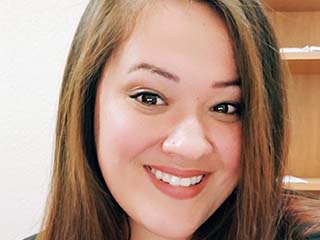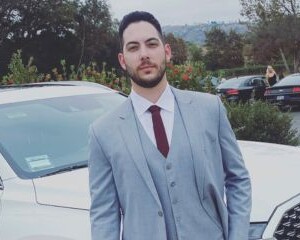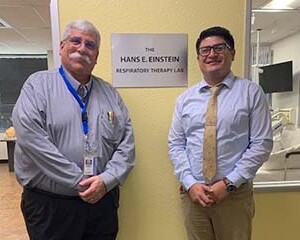Future Respiratory Therapists groomed for success by previous graduate of their program
 In six short years Cara Cunningham shot from the status of graduate from SJVC’s Respiratory Therapy program on the Visalia campus to the program’s Director.
In six short years Cara Cunningham shot from the status of graduate from SJVC’s Respiratory Therapy program on the Visalia campus to the program’s Director.
Her education arc was focused. After graduation from SJVC, Cara passed required exams to become a Registered Respiratory Therapist. She then earned the Neonatal Pediatric Specialist (NPS) credential and completed her Bachelor’s degree in Respiratory Care.
Cara didn’t begin her career education with a clear plan. Although she always had an interest in the medical field, she did not feel that nursing was the right fit. It was a 2012 meeting with a SJVC Admissions Advisor and a tour of the Visalia campus that convinced Cara that Respiratory Therapy was her calling. “Respiratory Therapy is a specialist field,” she says. “You get a more focused breadth of knowledge, but it’s one with a lot of depth.”
She was an accomplished Respiratory Therapy program student and graduated at the top of her class.
Within a couple of months after graduation, Cara signed on as a Registered Respiratory Therapist (RRT) at one of her program’s clinical rotation sites, where she provided care for patients in all departments of the hospital.
She enjoyed being an integral part of a health care team where Respiratory Therapists worked shoulder-to-shoulder with physicians and other medical staff. “Physicians make sure the big picture is headed in the right direction, while it’s the RT’s job to monitor the cardio-pulmonary status of the patient,” says Cara. “We have to know how that system is affected and how it affects everything else in the body. We make assessments, perform therapeutic interventions and make recommendations to the physicians.”
Respiratory Therapists have their professional thumb on the pulse of patients in their care. “We are focused on one specific area: the cardio-pulmonary system. If that is not functioning, you are not breathing. We can intervene and, hopefully, save a life,” says Cara.
Cara has always been interested in teaching and sharing her knowledge and experience with others coming up in her field. She enjoys the experiential, hands-on clinical side of instruction, but was hesitant to leave patient care for a classroom when opportunities to be an instructor came along. When she was approached with an offer to provide clinical instruction to SJVC Respiratory Therapy program students at their clinical sites, she felt the match-up.
“I do have a place in my heart for SJVC because they allowed me to start my career in the health care field,” says Cara. She knew she had something of value to bring not only to students and faculty, but to the level of professionalism and idealism she could heighten through those entering the field she loves.
“The field, overall, has moved toward this idea of an RT being a strong, critically-thinking clinician,” says Cara. She wants her students to understand the significance of ‘therapist’ in their job title. “The ‘T’ does not stand for ‘technician’; it means ‘therapist’,” she emphasizes. “A technician deals with equipment, but a therapist is someone who looks at overall patient conditions and develops a pro-active approach to patient care.”
Elevating the profession frames her teaching style. “This is what I am very passionate about: driving the profession towards that goal where everyone is a clinician,” says Cara.
Just a few months ago Cara was invited to lead the clinical studies aspect of RT students’ experiences as Respiratory Therapy program Director Clinical Education. In this position she could even more effectively groom students toward greater success within their chosen field.
Cara’s strengths and commitment were, again, recognized. An offer of a position of even great influence was made and accepted. As of June 1, Cara will expand the platform from which she participates in Respiratory Therapy program development and student and graduate support and success, as the new Program Director on the Visalia campus.
It is simple math. Cara’s philosophy and voice can reach a classroom, an even larger group of students or the program faculty who will reach them all. She is excited to have the opportunity to share her vision with those who might amplify its projection.
“I’m lucky to have fantastic staff and faculty in our program who share a vision,” says Cara. “We want to mentor our students and guide them to become strong members of the healthcare team.”
Cara knows SJVC has something special to offer students in all the medical, business and technical programs on its California campuses. Accelerated programs that award certifications, Associate’s and an online Bachelor’s (Bachelor Science in Respiratory Therapy, only) degrees allow students to complete studies in tighter timeframes that better fit work and life schedules.
“We set you up for success,” Cara says of the comfortable enrollment process, outcome-oriented curriculum, faculty support and career services assistance the college provides students and graduates. Using an example of the Respiratory Therapy program, she lays out the advantages. “That we (SJVC) are all inclusive is a big draw for any prospective student. In community colleges there are usually a lot of prerequisites that have to be done ahead of time, or it’s lottery based to even get in.”
It is time and investment and how that ratio provides the best career outcome. “It’s a two-year degree in just under 20-months,” says Cara. “Having been through this program myself, I know it’s not easy. But if you put in the effort, we’re going to make sure you have all you need to be successful.”
She adds to the picture. “You can get your Associate’s degree with transferrable units for a Bachelor’s. We have students do mock Board exams that prepare them to take their actual exams, get licensed and go out and practice.” She makes another important distinction that SJVC RT students and graduates enjoy. “The majority of us (faculty) aren’t educators first; we are therapists who also educate. We have patient bedside experience that bridges the gap between textbooks and hands-on experience.”
For Cara, student success is paramount. “I want students to be able to correlate what they’re learning from the book and apply that information to how a patient might present in a hospital.” When she instructs a class, students might want to buckle up. “I will do everything in my power to get students to understand whatever concept they’re struggling with. I tell them that I have no problem explaining things in as many ways as I can think of until they get it.” She refuses let students give up on themselves.
Cara has a relentless work ethic, a driving commitment to succeed and an enormous heart to care for the needs of others at the forefront of her vision for the lives she hopes to touch. It is personal as well as professional.
She will set a pace that many will quicken their steps to follow.
You might also like
More stories about
Request Information
All fields using an asterik (*) are required.


